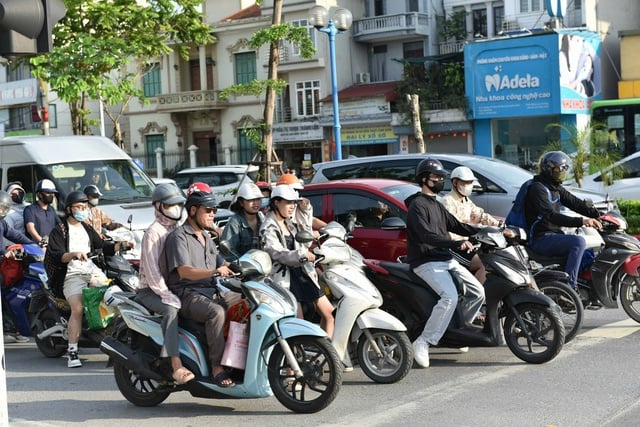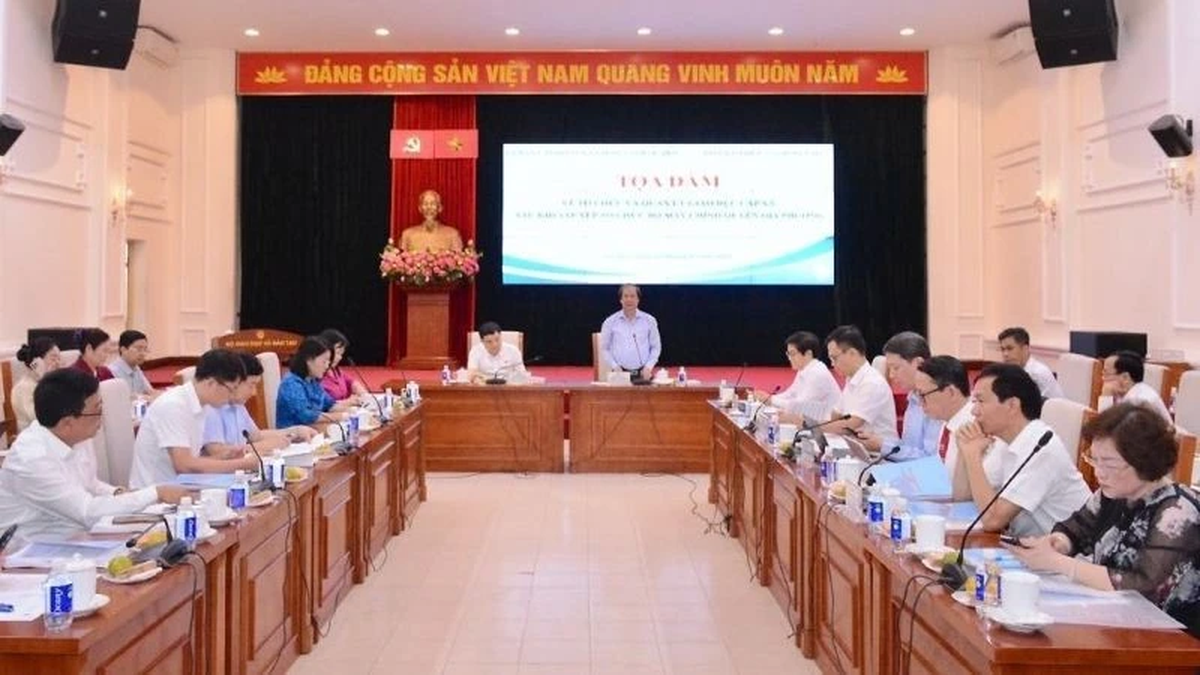Hanoi proposes many specific policies to support people in switching to electric vehicles. Photo: VGP/TL
Expected support of 3 million VND/vehicle for individuals
The Hanoi Department of Construction is seeking comments from relevant departments, branches and units on the draft Resolution on converting to green vehicles and developing a charging station system in the city.
The draft is currently being completed to report to the City People's Committee to submit to the City People's Council for consideration and approval at the September 2025 meeting.
Some outstanding policies in the draft Resolution include: Direct cash support for people with gasoline or diesel motorbikes (registered before the resolution takes effect) in low-emission areas, when switching to green vehicles (with a value of 15 million VND or more).
The support level is 3 million VND/vehicle for individuals; 4 million VND/vehicle for near-poor households; 5 million VND/vehicle for poor households. Each individual is supported with a maximum of 1 vehicle until the end of 2030.
Support preferential loans with interest rates from 3% - 5%/year, limit of 100% of contract value, maximum loan term of 5 years for public service units; passenger transport units (except buses) and freight transport; enterprises investing in facilities for collecting and recycling old vehicles.
100% exemption of registration fees and license plate registration fees for green vehicles from the effective date of the resolution until the end of 2030.
Cameras will be installed to monitor fines.
The draft resolution also proposes a roadmap for piloting and expanding the ban on personal gasoline/diesel vehicles. Accordingly, the pilot restriction on gasoline-powered motorbikes will be from January 1, 2026 to June 30, 2026.
Banning fossil fuel motorbikes in Ring Road 1 from July 1, 2026, and in Ring Road 2 from January 1, 2028.
Restrict personal cars using gasoline/diesel in Ring Road 2 from January 1, 2028; expand to Ring Road 3 from January 1, 2030.
From 2035-2050, non-green motor vehicles (including CNG and hybrid vehicles) will be restricted at each level. Specifically, restrictions will be placed in Ring Road 1 from 2035, in Ring Road 2 from 2040, in Ring Road 3 from 2045, and city-wide restrictions will be placed from 2050.
Hanoi will also collect traffic fees and increase parking fees for polluting vehicles (gasoline or diesel vehicles) according to a limited roadmap.
At the same time, organize traffic, install signs for restricted areas. Apply science and technology, install cameras to issue fines to monitor and increase patrols and controls. For violations of emission regulations or circulation in restricted areas, higher administrative penalties will be applied (not exceeding 2 times the general fine prescribed by the Government).
Prioritize investment in charging stations on sidewalks
To ensure the above goal is achieved, the City People's Committee requires that at least 10% of parking spaces at existing projects must have charging stations before the end of 2026; at least 30% of parking spaces at new projects must have charging stations. At the same time, priority is given to building charging stations on sidewalks and investment in hydrogen and other clean fuel stations is encouraged.
Public charging station infrastructure investment projects will receive 70% of bank loan interest support from the budget for the first 5 years. Bus station and parking lot projects with 30% or more parking spaces equipped with charging posts will receive 50% support for site clearance costs and 100% land rent for the first 5 years.
Notably, the City strongly encourages investors to participate in developing clean energy transport infrastructure through the form of PPP (public-private partnership). These investors will be given priority in land allocation and 100% support for land rent at planned locations until the end of 2033.
The city also commits to synchronously investing in transport and technical infrastructure to effectively connect with clean energy station projects. In parallel with the above policies, the Department of Construction will supplement specific processes and procedures for beneficiaries to enjoy incentives and support, avoiding the situation where policies are issued but not effectively implemented.
After the Resolution is issued, the Department of Construction will advise the City People's Committee to issue a detailed plan assigning specific tasks to each relevant agency to implement policies, including: Financial policies, fees and charges; Management and removal of old vehicles; Monitoring, handling of violations and policies to support the development and encourage investment in charging stations...
Thuy Linh
Source: https://baochinhphu.vn/ha-noi-de-xuat-nhieu-chinh-sach-cu-the-ho-tro-nguoi-dan-chuyen-doi-xe-dien-103250716172458843.htm



































































































Comment (0)